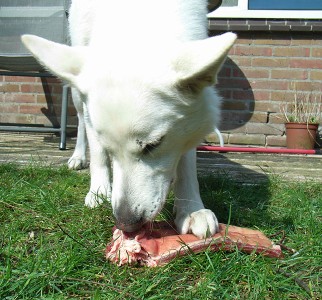 |
||
Overweight dogs--Solving the problemOverweight dogs and overweight humans is an increasing problem in Western Societies. There is absolutely no doubt that the cause of obesity in both species is overeating and a general lack of exercise. Dogs, like humans, become more prone to gaining weight as they get older.Obese dogs also become more susceptible to the type of illnesses that are directly connected to canine obesity such as diabetes, cardiovascular problems, arthiritis, pancreatitis, and increasing strain on the respiratory system, muscles and joints. In short, owners that refuse to recognise that their dog is overweight not only sentence their dog to pain and distress as their birthdays tick by, but they also effectively shorten their pet’s life. How to tell if your dog is oveweight .Try the rib test. A dog’s ribs shouldn’t be visible, however they should be quite easily felt benath the skin. Just run a finger along your dog’s ribcage. Can you feel all of the ribs without pressing inwards? Can you easily count all of the ribs? What about your dog’s waist does the undercarriage have a pronounced tuck when viewed sideways on? When you run your fingers along ot can you feel the indent, or does it sag.You should of course consult your vet before you make any snap judgements. Some breeds are overweight but carry it off relatively well. Sometimes the weight gain isn’t through the most obvious causes. Your vet is there to advise you. 
How to make certain that your pet doesn’t become an obese dog.Your dog’s health is your responsibility, and feeding is an essential part of your overall dog health plan. If your going to avoid any problems with overeating, or you've already recognised that your dog has a weight problem, then your going to need abide by a few rules:Rule 1: Only one household member is responsible for feeding the dog. This ensures that the dog doesn’t get fed twice because someone notices the bowl is empty. In a busy household this can easily happen. Most dogs love their food, and will work out ways to get more than their quota if possible. So make sure that you keep to your dog’s daily recommended guidelines for the type of food you are feeding him. Rule 2: An adult dog only needs 1 main meal a day, or 2 small ones. Don’t leave his food lying in the bowl if it remains uneaten, clear it away. Have a set time for meals and keep to it. Preferably mid-day which then gives your dog the rest of the day to burn off the calories. Don’t allow your dog to become a “beggar”. If you do you create a habit that is extremely difficult to break. Make sure that table scraps, if you do feed them, are not of the fattening for humans variety. Pizzas, doughnuts, cakes, desserts, shouldn’t form any part of a dog’s diet. Vegetables and fruit should. Rule 3: Treats should be just that. A treat shouldn’t be something that you give your dog randomly, and whenever you feel like it. Decide what treats your going to give to your dog, when, and in what quantity; and stick to that. Don’t be suckered in by that cunning canine charm. For more detailed information on Dog Feeding. Overweight dogs and exercise.Once you’ve got a good feeding regime working the next step in your dog’s health plan is exercise. If your dog is already seriously overweight take the same advise as you would get at the Gym if it was you with the problem: Start off easily. This is especially relevant if your dog is no longer young and spritely.If previous exercise had amounted to 20 minutes per day, increase it by 5 minutes per day on a weekly basis. Later, begin taking along a ball or similar toy, start by throwing it just ahead, then increase the distance.
The goal is to see your pet running freely, no longer encumbered by carrying excess weight. You’ll recognise when your goal is getting closer, and when it is finally achieved. An important point to remember is that you should consult your veterinarian before embarking on any radical changes in your dog’s diet, or his exercise patterns. Don’t put your dog’s health at risk by not taking professional advise beforehand. For more detailed information on Exercising your Dog. By following a few simple rules and sticking to a regular exercise routine, any problem that you might of had with overweight dogs, would definitely become a thing of the past.

"
| ||
|
| Dog Health Start Page | Dog Neutering |Caring for an Older Dog |Dog Names Start Page |Dog Videos Start Page | Return to Homepage Or you can .........
|
||
|
|
||